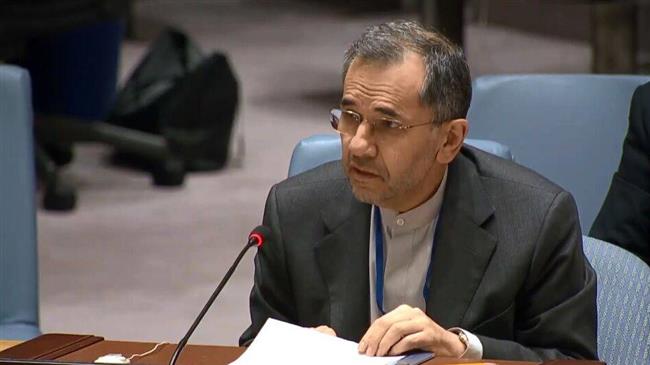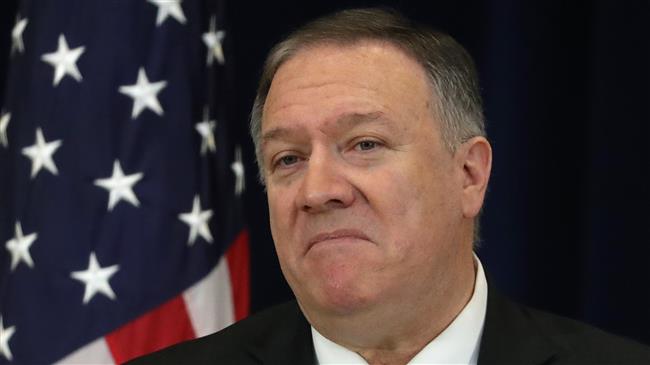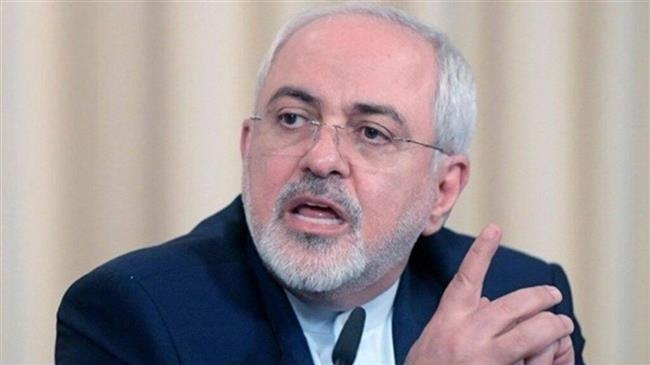US sanctions against Iran aimed at collectively punishing ordinary people: UN ambassador
Iran's ambassador to the United Nations has severely censured the United States’ sanctions against ordinary people as well as different sectors of the Iranian economy, including oil and banking, arguing that the measures are negatively affecting the daily lives of millions of Iranians.
Speaking at a United Nations General Assembly meeting in New York on nuclear non-proliferation and implementation of Resolution 2231, which backed the 2015 Iran nuclear deal – officially known as the Joint Comprehensive Plan of Action, Majid Takht-Ravanchi stated that the US sanctions "are neither short of war nor better than or an alternative to war," and that they are actually tantamount to war "but by other means and names."
He further noted that Washington has extended its sanctions against Iranians through weaponizing food and medicine, and in total disregard of the International Court of Justice (ICJ) ruling on October 3, 2018.
The United Nations' highest court ordered the US at the time "to lift sanctions linked to humanitarian goods and civil aviation imposed against Iran."
“By any measure, the US sanctions are illegitimate, immoral, inhumane and cruel. It is a shame that the US bullying has resulted in discontinuation of export of certain medicines to Iran, causing nightmare for some patients,” Takht-Ravanchi said, arguing that a European pharmaceutical company has stopped exporting special bandages required for people suffering from a rare skin condition known as epidermolysis bullosa (EB) to Iran due to the restrictions.
Often known as butterfly children because their skin is as fragile as the wings of a butterfly, EB patients need special care. Even mild frictions or bumps cause severe blistering of the skin which is very painful.
They often have difficulty with their daily activities, such as walking, eating and even breathing, but without proper protective bandages, their agony would be heartbreaking.
The Iranian UN envoy said in his speech that the US strategy of exerting "maximum pressure" on Tehran are tantamount to economic terrorism, and is claiming the lives of innocent people.
“Therefore, those who have been involved in designing, advocating and executing these sanctions must be held accountable,” the diplomat pointed out.
Takht-Ravanchi also touched upon Washington’s withdrawal from the JCOPA, and slammed the US for preventing other countries from doing business with Iran and fulfilling their commitments under the nuclear agreement.
The Iranian diplomat underlined that Tehran continues to implement its commitments under the JCPOA, even though the remaining parties to the accord have failed to materialize their compensation assurances in establishing effective financial channels, oil export, shipping and insurance.
“Unilateral implementation of the JCPOA is not sustainable. The deal needs more than one willing and able party to be fully implemented.
“Iran has ceased performing its commitments in part in accordance with paragraphs 26 and 36 of the JCPOA. To give room for diplomacy, a step by step approach with two months’ intervals has been designed,” he said.
“Iran’s steps are reversible, but the damages inflicted upon Iran and the Iranian people due to illegal sanctions are not reversible at all,” Takht-Ravanchi highlighted.
The senior Iranian diplomat went on to say that Washington’s offer of unconditional talks with Tehran is disingenuous given the fact that the US tends to enter a dialogue from a position of strength and not based on equal footing.
“The call for dialogue with Iran while simultaneously insisting on the application of maximum pressure policy against the Iranian people is mutually exclusive. Iran does not negotiate under the threat of a sword,” Iran's ambassador to the United Nations pointed out.
He said certain countries have been trying to include extraneous matters since the conclusion of the JCPOA, noting that Iran’s legitimate defensive capabilities are non-negotiable and that the country’s missile are “not designed to be capable of delivering nuclear weapons.”
Tensions have been running high between Iran and the United States since May 2018, when US President Donald Trump unilaterally withdrew his country from the JCPOA, and unleashed the “toughest ever” sanctions against the Islamic Republic.
Since quitting the landmark 2015 nuclear deal with Iran, Trump has been running a "maximum pressure" campaign to force Iran into negotiating a new deal that addresses its ballistic missile program and regional influence.
Iran, which had been fully complying with all of its commitments despite the US withdrawal and the Europeans’ failure to abide by their obligations under the deal, began scaling down its commitments in early July.
VIDEO | Report flags India’s violation of rights of Rohingya detainees
Turkey's foreign minister meets Syria's de facto leader in Damascus
'Next to impossible' to rescue patients from Gaza's Kamal Adwan Hospital: Director
VIDEO | Vietnam current prosperity
Report blames gasoil exports for shortage at Iranian power plants
VIDEO | Hind Rajab Foundation names Israeli war criminals vacationing after Gaza genocide
VIDEO | Australians rally for Gaza ahead of Christmas festivities
VIDEO | Attacks on Sana'a





















 This makes it easy to access the Press TV website
This makes it easy to access the Press TV website